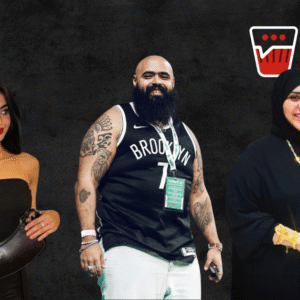Right now, Egypt is seeing one of the biggest crackdowns on content creators in years. Tens are being arrested, while many are facing charges like “violating family values” and “offending public decency.” TikTok itself has been given a three-month warning to clean up its content or face the possibility of being banned entirely in Egypt.
The official narrative is about protecting morals, preserving “family values,” and safeguarding the “fabric of society.” But the real question is: who exactly are these values protecting, and who is paying the price?
The Double Standards We Don’t Talk About
If morality was truly the concern, then why are Egyptian cinema’s biggest names celebrated for movies where the entire punchline is built on sexual harassment, assault, and rape jokes?
Adel Imam’s films often use the sexual assault of women as comedy. Tamer Hosny’s rom-coms are filled with harassment disguised as charm. Even the promotional songs for these “family-friendly” films — marketed to audiences that include children — carry verbal harassment dressed up as a joke.
You could practically play bingo with the number of harassment scenes passed off as “flirting” or “comedy.”
These movies are still broadcast on TV. They’re still quoted in everyday conversations. They’re still sold as part of Egypt’s so‑called “golden” entertainment era. No outrage. No lawsuits. No public morality crusade.
But a working-class TikTok dancer, or even an adult‑targeted content creator and stand‑up comedian like Abdelaty, is treated as a public threat. The outrage is immediate. The punishment is swift.
The Crimes No One Is Talking About: The Money Laundering We All Know Is Happening
While moral outrage dominates the headlines, the real criminal activity is hiding in plain sight. Social media platforms have become breeding grounds for money laundering schemes, and the problem is far bigger than a few provocative videos.
Many creators — especially from poorer backgrounds — have no idea how to monetize their accounts or even open a bank account.
That is when “managers” step in. They take control of the creator’s pages, collect the platform’s payouts, and act as middlemen for much bigger players.
These bigger players send massive amounts of “online gifts” through the platform, sometimes worth thousands or even millions. The platform converts these gifts into cash. The manager collects the “clean” money, throws a small cut to the creator to keep them loyal, and passes the rest back to the real bosses.
The creator appears to have struck gold — designer clothes, luxury trips, and a flashy lifestyle often encouraged by their manager. But it is all temporary. When the bosses move on, the money dries up, the lifestyle vanishes, and the managers find someone new to exploit.
This is not just exploitation. It is a structured system that uses people as disposable tools to wash dirty money.
Turning Potential Into Purpose
And while we are on the topic of morality, it is not the responsibility of TikTok or any other platform to parent children. That role belongs to parents. If a child is consuming content meant for adults, the problem is not the creator alone — it’s the lack of supervision at home.
Another popular argument is that these creators “make Egypt look bad.” If that is the concern, then locking them up is not the solution. How about educating them instead? How about looking into the social and economic reasons that lead them to this type of content creation in the first place, and actually addressing them?
Whether we personally enjoy their content or not, whether we think it’s good or bad, these creators have potential. With the right guidance, training, and opportunities, they could channel their reach and influence into something that benefits both them and society. Throwing them in prison doesn’t fix the problem — it just destroys lives and wastes potential.
The Real Question
If this was truly about morality, then the priority would be shutting down the exploitation networks, investigating the laundering schemes, and holding accountable the people profiting from them.
Instead, morality is used as a selective weapon against those with the least power to defend themselves.
So before we keep talking about “protecting family values,” maybe we should be asking: whose values are these, and who benefits from enforcing them?
Until the real crimes are addressed and the double standards dismantled, “family values” will remain less about morality and more about control. And it is always the same women — poor, marginalised, and unprotected — who end up paying the price.





